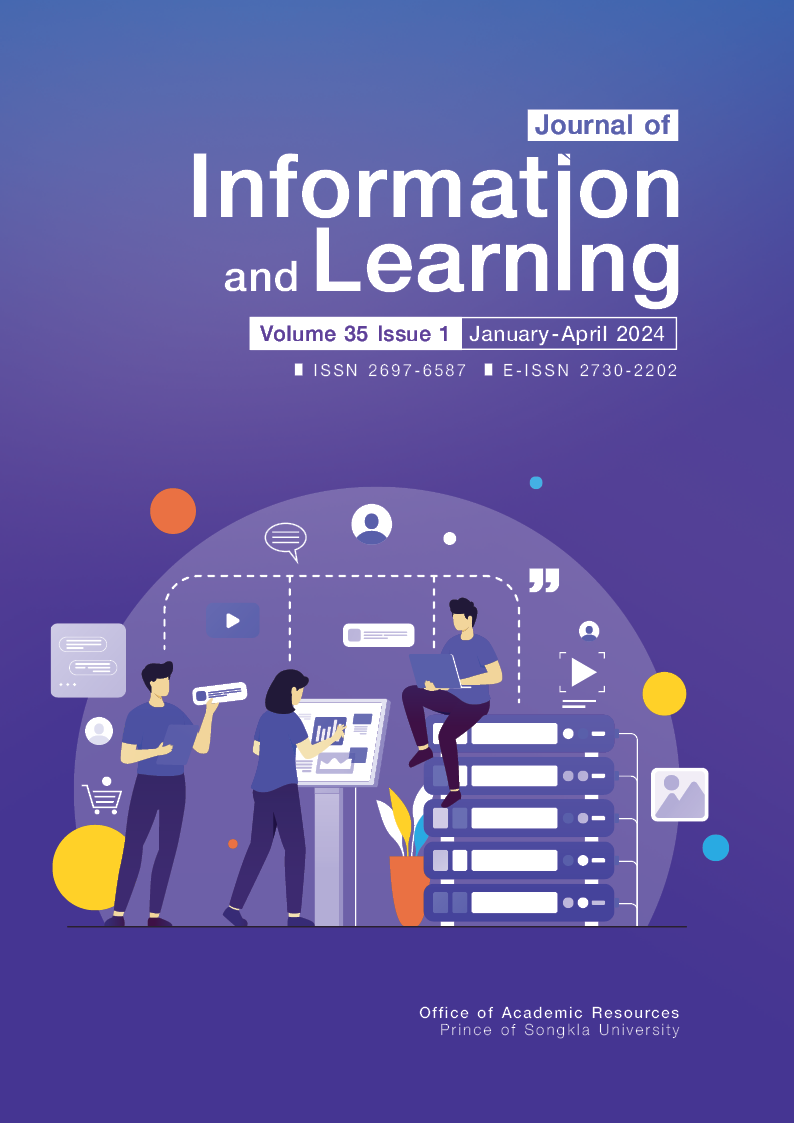Social Media Usage Behavior and Information Literacy Levels of Undergraduate Students at Prince of Songkla University, Pattani Campus
Main Article Content
Abstract
This research aims to investigate online social media usage behavior, information literacy levels, and diverse characteristics of students in connection with their online social media usage behavior and information literacy levels. This study focuses on undergraduate students participating in the Digital Literacy course at Prince of Songkla University, Pattani Campus, during the second semester of 2022. A sample of 400 students from this course was selected for this study. An online questionnaire was used for data collection. Data analysis involved employing a range of statistical methods, such as frequency, percentage, means, standard deviation, t-test, one-way ANOVA, and chi-square analysis.
The findings suggest that 1) most students spend more than three hours daily on online social media, primarily YouTube and Instagram. The highest average score for online social media usage behavior occurs when students refrain from emulating or imitating inappropriate comments, texts, or images observed from others. 2) The highest average information literacy level among students lies in their ability to select effective information search methods for obtaining desired information. 3) Analyzing differences between personal characteristics and online social media usage, employing t-tests, One-way ANOVA, and Chi-square analysis, revealed that gender, academic year, and affiliated faculty significantly influenced students' online social media behavior at a statistical significance level of .05. Three prominent issues have emerged: the spread of misinformation, sharing positive content, and using online social media for necessary purchases. 4) The analysis of differences between personal characteristics and information literacy levels indicated no statistically significant variations in corresponding aspects at the .05 significance level. The study's outcomes aim to improve digital literacy education and advocate the integration of online media production as a learning channel for other subjects in the future.
Article Details

This work is licensed under a Creative Commons Attribution-NonCommercial-NoDerivatives 4.0 International License.
The Journal of Information and Learning is operated by the Office of Academic Resources, Prince of Songkla University. All articles published in the journal are protected by Thailand copyright law. This copyright covers the exclusive rights to share, reproduce and distribute the article, including in electronic forms, reprints, translations, photographic reproductions, or similar. Authors own copyrights in the works they have created as well as the Office of Academic Resources. The Journal reserves the right to edit the language of papers accepted for publication for clarity and correctness, as well as to make formal changes to ensure compliance with the journal's guidelines. All authors must take public responsibility for the content of their paper.
References
Ata, R., & Yildirim, K. (2020). Analysis of the relation between computational thinking and new media literacy skills of first-year engineering students. Journal of Educational Multimedia and Hypermedia, 29(1), 5-20. https://www.researchgate.net/publication/338402329_Analysis_of_the_Relation_Between_Computational_Thinking_and_New_Media_Literacy_Skills_of_First-Year_Engineering_Students
Celik, I., Muukkonen, H., & Dogan, S. (2021). A model for understanding new media literacy: Epistemological beliefs and social media use. Library & Information Science Research, 43(4),101125. https://www.sciencedirect.com/science/article/pii/S0740818821000554
Chaitep, T., & Chanvichai, K. (2021). A study of media literacy in university student in northern. Journal of Business, Economics and Communications, 16(2), 97-106. https://so02.tci-thaijo.org/index.php/BECJournal/article/view/241594/
Electronic Transactions Development Agency. (2023). Thailand internet user behavior 2022. ETDA. https://www.etda.or.th/th/Useful-Resource/เอกสารเผยแพร/รายงานผลการสำรวจพฤตกรรม-ผใชอนเทอรเนทในประเทศไทย-ป-2565.aspx
Euamornvanich, P. (2018). Media literacy in social media. The Golden Teak: Humanity and Social Science Journal, 24(Special Issue), 22-30. https://research.kpru.ac.th/Joumal_HSS/journal/9442020-02-12.pdf
InfoQuest. (2023, January 10). Fē sabuk læ lai nangthǣn sư̄ sō chīa lamī dīa yō̜t niyom [Facebook and Line are popular social media platforms]. Dataxet: InfoQuest. https://www.infoquest.co.th/thailand-media-landscape-2023/social-media
InsightERA. (2023). Sarup khō̜mūn thī khūan rū digital sō̜ngphanyīsipsām Thailand čhāk we are social læ meltwater [summarize key information digital 2023 Thailand from we are social and meltwater. InsightERA. https://www.insightera.co.th/digital-2023-thailand/
Janwitchano, S., Vadhanasin, V., & Sanwa, S. (2022). Online social media literacy skills of undergraduates in autonomous universities in Bangkok. Journal of Library and Information Science Srinakharinwirot University, 15(1), 36-51. https://so02.tci-thaijo.org/index.php/JLIS_SWU/article/view/256811
Khamsombut, K., Kunasit, T., & Chaikiattidham, A. (2020). Assessment of information literacy and self-efficacy Northeastern Rajabhat University. Journal of Information Science, 38(2),1-16. https://so03.tci-thaijo.org/index.php/jiskku/article/view/222296
Klinlekha, P. (2018, July 20). The effect of social media on students at Hatyai University, Songkhla Province. The 9th Hatyai National and International Conference "Education, Economic and Digital Society", Songkhla. https://www.hu.ac.th/Conference/conference2018/proceedings/contents.html
Ounjitti, D., & Teeraruangsiri, S. (2020). The relationship between information behavior and innovation behavior of undergraduate student, Faculty of Humanities and Social Science, Burapha University. Burapha University Research Information. https://buuir.buu.ac.th/handle/1234567890/4075
Phookwantong, J., Parapob, J., & Nunumvong, V. (2021). The use of online social networks for learning of Rajamangala University of Technology Srivijaya, Songkhla Students. Journal of Humanities and Social Sciences Mahasarakham University, 40(1), 21-34. https://so03.tci-thaijo.org/index.php/humsujournal/article/view/242782
Prajitr, S. (2020). A study of social media using behavior of Business Administration Faculty of Students Bangkok Thonburi University. Bangkok Thonburi University Research Document. https://research.bkkthon.ac.th/abstac/ab_28052563092427.pdf
Prasitwisate, G. (2018). Media literacy, self-awareness and information exposure behavior on social media of university students. Journal of Humanities and Social Sciences Mahasarakham University, 37(1), 200-213. https://hujmsu.msu.ac.th/pdfsplit.php?p=MTU5OTAxNTg5NC5wZGZ8MjA5LTIyMg==
Roobyai, C. (2022). A study of online social media usage behavior with learning in the 21st century of the undergraduate students in the Faculty of Humanities and Social Science, Ubon Ratchathani Rajabhat University. Humanities and Social Sciences Journal, Ubon Ratchathani Rajabhat University, 13(1), 288-296. https://so01.tci-thaijo.org/index.php/humanjubru/article/view/250263
Sarawanawong, J., Fyeted, K., Ngernpoolsap, D., & Chantrdee, W. (2017). Online social media usage behaviors of undergraduate student, Kasetsart University. Journal of Library and Information Science Srinakharinwirot University, 10(2), 16-31. https://ejournals.swu.ac.th/index.php/jlis/article/view/9954
Sirirat, S., Sacchanand, C., & Panmekha, P. (2012). Information literacy of undergraduate students, Faculty of Education, Songkhla Rajabhat University. Journal of Library and Information Science Srinakharinwirot University, 5(1), 26-38. https://ejournals.swu.ac.th/index.php/jlis/article/view/2290/2329
Srisa-at, B. (2017). Preliminary research (10th ed). Suviriyasan.
Wannaprapha, S., Sengmanee, S., Phunssumraan, P., Takong, W., & Somphun, K. (2019, November 15). Social media usage behavior of undergraduate students, Faculty of Communication Arts, Rambhai Barni Rajabhat University [Conference session]. Graduate School Conference 2019, Bangkok. http://journalgrad.ssru.ac.th/index.php/miniconference/article/view/2116
Watana, C. (2021). Social media usage behaviors of undergraduate students, Srinakharinwirot University. Journal of Library and Information Science Srinakharinwirot University, 14(2), 1-12. https://so02.tci-thaijo.org/index.php/JLIS_SWU/article/view/249331


